Associate Professor David Bockino and 19 students in his Through the Lens of ESPN class enjoyed an in-depth tour during Winter Term of Argentina and Uruguay, exploring athletic venues, national media outlets, and the importance of soccer in South American culture.
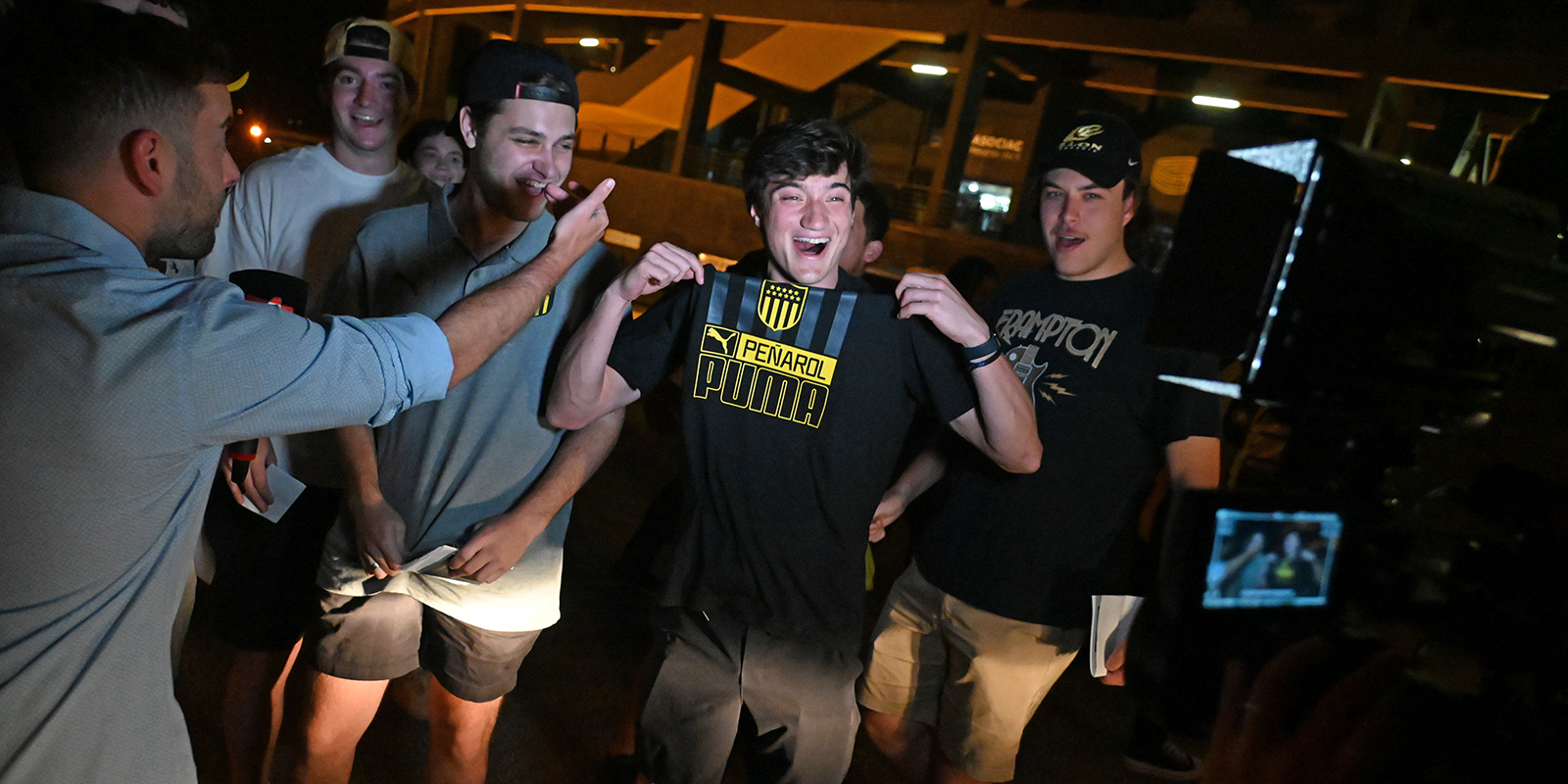
The energy of the crowd, entirely clad in yellow-and-black regalia, was palpable as the Uruguayan soccer fans advanced toward the concrete entryways of the Estadio Campeón del Siglo, home of Club Atlético Peñarol.
Not surprisingly, the enthusiasm for the club’s Jan. 20 match with Unión de Santa Fe carried over to the 19 students in Associate Professor David Bockino’s Through the Lens of ESPN class, who were in Uruguay – and attending the game – to immerse themselves in soccer, sports media and South American culture.
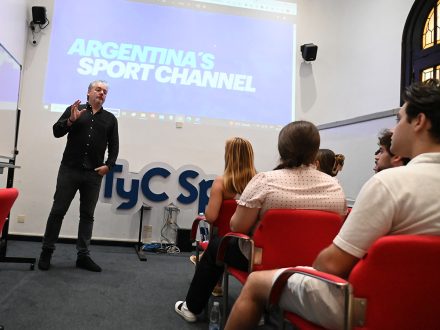
The excitement led Elon junior Will Thalhimer, a creative writing major, to initiate an on-camera interview with a nearby news crew that was the perfect summation of Bockino’s Winter Term course.
Flanked by a handful of cheering classmates, and blanketed in white by the camera’s bright lights, Thalhimer spoke excitedly about the upcoming match with a reporter from Canal 4, a Montevideo-based television station that the class actually visited earlier that day, in front of a stadium the students extensively toured the day prior. In just four days, the class had fully engrossed itself in Uruguay’s sports and culture.
“As I put together the curriculum for this course, my goal is always for students to learn the material and then to live the material,” Bockino said. “If we’re going to study the intersection of sports, media and society, we shouldn’t just read about the history of Argentina’s biggest national sports network; we need to tour the studios and talk to their employees. We shouldn’t just learn the rules of polo, one of the country’s oldest sports; we have to jump on a horse and play it. And we shouldn’t just watch a video about Argentina and Uruguay’s intense soccer rivalries; it’s important to visit the actual stadiums, talk to the fans, and – hopefully – attend a match. In true Elon fashion, this is experiential learning at its very best.”
In total, Bockino’s class – largely a mixture of School of Communications and Love School of Business students interested in sports and sports media – spent 12 days abroad, kicking off with a weeklong stay in Buenos Aires, followed by four days canvassing much of the southern region of Uruguay and its capital, Montevideo. The Argentine highlights, of which there were many, included visiting the iconic home stadiums for Club Atlético River Plate and Club Atlético Boca Juniors, as well as an exclusive tour of the Argentina National Soccer Team Training Center. Yes, the same facility where the Argentina National Team – and the one and only Lionel Messi – trained prior to winning the 2022 FIFA World Cup in Qatar.
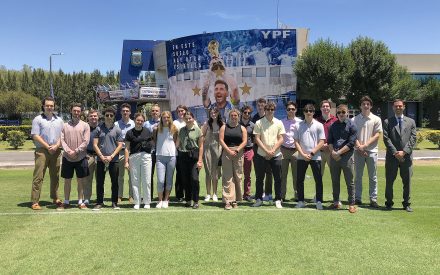
“We got extra lucky this year, with Argentina winning the World Cup in December,” Bockino said. “I can talk for months about how important soccer is to the people of Argentina and how it’s like a religion – a phrase repeated by our hosts throughout our two weeks on the ground – but the videos of Argentines celebrating in the streets of Buenos Aires were a hundred times more powerful than anything I was saying. Fortunately, the country was still smiling when we got there and coverage of the victory was still ongoing, making it the perfect location to immerse ourselves in the country’s sports culture.”
While in Buenos Aires, the class also met with staff members of TyC Sports, an Argentine television sports channel, and the network’s programming chief, Pedro Freire. During an informative, hourlong conversation, Freire broke down TyC Sports’ business model, content portfolio, stakeholders and staff responsibilities, often turning to a dry erase board to further explain his points.
With three decades in television production and 25 years with TyC Sports, Freire provided great insight into how the network meets the needs of its customers, often tailoring its sports coverage depending on the interests of the country’s respective regions.
“It allows us to get closer to the costumers – an advantage over international competition like ESPN,” Freire said.
Michael Brown ’23, a cinema and television arts and media analytics double major, said he appreciated hearing from Freire about how TyC operates, while getting a glimpse inside its production.
“It was interesting to hear their perspective on a more national level,” the Elon senior said. “You could feel the sense of pride they have for their company. It really seems like they use a business model that fits their consumer, and that they care about their consumer.”
Click here to see the photos from the course’s time in Argentina.
Following seven days in Buenos Aires, the class changed locations and ferried to Montevideo. The student group toured Estadio Centenario, which hosted the inaugural 1930 FIFA World Cup; Gran Parque Central, the oldest current stadium in America; and the aforementioned Estadio Campeón del Siglo. While this year’s trip was Bockino’s third Winter Term class visit to Argentina – last year’s class instead traveled to Spain – it was the first time the course has ventured to Uruguay. The addition to the itinerary made sense considering the country’s significance in soccer history.
“As the host of the first-ever men’s World Cup and as one of only six countries to have won the tournament more than once, Uruguay allowed for us to explore a similar level of passion from a different national perspective,” Bockino said. “There, the talk was more about the past and what had happened. In Argentina, the talk was definitely more about the present and what was happening. And yet somehow, everybody was happy for Lionel Messi, the Argentina legend and the most famous athlete on the planet.”
Additionally, the class completed a series of media company visits, touring and meeting with representatives at El Observador, a Uruguayan newspaper, and Montevideo COMM, a digital development and communications firm, as well as a visit to Canal 4’s studios and offices.
Click here to see photos of the students in Uruguay.
Experiencing South America
Mixed in among the soccer venues and media company visits were a few experiential extracurricular activities. The entire class visited the stunning Estancia Villa Maria, a historic estate located about 45 minutes outside of the capital, for an introduction to polo. It was a fitting activity considering many of the world’s best polo players hail from the South American country. The visit featured students riding horseback and playing in an abbreviated game. For several students, it was the first time they had ridden a horse, let alone play polo.
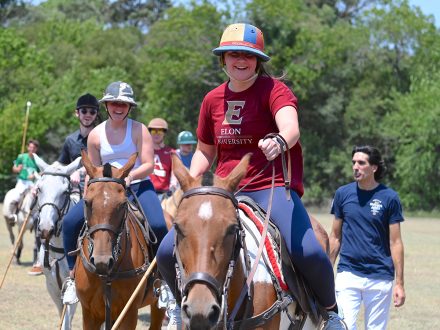
Brown, an avid athlete from Colorado, relished the chance to play a new sport. “It was such a unique opportunity that I might never have again,” he said. “It was so much fun. The sport moves really fast. I just wish I was a lot better at it. But getting to know how to play, and talking to professionals, was something I won’t forget.”
Click here to see photos of students on horseback.
Furthermore, the class visited the campus of Argentine University of Enterprise (UADE), the capital’s largest private higher institution with nearly 35,000 students. Juan Franchini, a sport consultant and UADE sport management professor, helped facilitate several activities during the course’s time abroad, including its stop at TyC Sports, the campus tour, as well as the visit to the national team’s training center.
Bockino and his students also enjoyed a boat tour of the Tigre Delta, the fifth-largest delta on the planet, which consists of more than 350 rivers and natural streams. And it wasn’t the group’s only time on the water. While in Uruguay, the class traveled to the seaside city of Punta del Este, a popular vacation destination on the southernmost point of the country. The class divided into two boats for a three-hour fishing excursion, dropping fishing lines where the ocean and river meet.
Presentations, then passports
During the first week of Winter Term and leading up to the course’s departure for South America, Bockino put forth what he considered a daunting assignment.
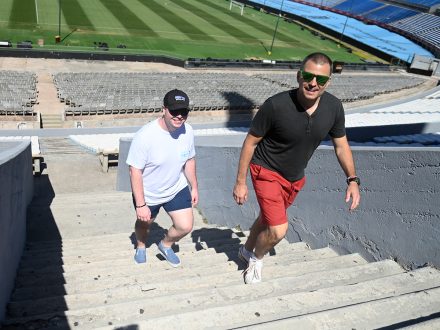
The students had just a few days to research the sports social media habits of college students, while also studying ESPN’s social media strategy. They were then tasked with comparing the two in a Zoom presentation with Brendon Martin, multi-platform growth and development specialist at ESPN; Brad Klier ’20, programming coordinator at ESPN; and Lauren Belk ’21, partnership marketing coordinator at Stewart-Haas Racing. In addition to being Elon graduates, Klier and Belk are both alumni of Bockino’s Winter Term course. By and large, Bockino applauded the four groups for their poise under the project’s tight turnaround, and the content of their presentations.
“It was a great way for students to explore the changing nature of sports media consumption and to get comfortable in a professional environment before our in-country company visits,” he said.
For Brown, traveling with Bockino was a big selling point for enrolling in the course. The duo has grown close conducting undergraduate research together and will travel in March to Barcelona for the annual summit of the International Association for Communication and Sport.
“Having that connection, I thought it would be fun to take a course abroad with Bockino,” Brown said. “I’m not a huge soccer fan, but I’m really interested the sports media/ESPN side of the course. And I thought it would be a great experience to learn more about the sport industry.
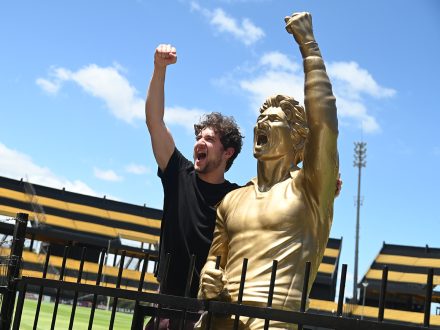
He added, “As part of the prep course, we looked at the intricacies of soccer, which have helped me understand the sport better and appreciate it more. It gave me a new perspective. Bockino did a good job helping us understand the importance of soccer here and around the world.”
Admittedly, Grace Dieleman ’24, a business analytics major and sport management minor, is not a soccer fan. But the Winter Term course made sense for her – a student-athlete on the Elon women’s track and field team – because of her general interest in sports and the opportunity to travel to a new destination.
“I knew I probably won’t come here on my own, so by enrolling in the course, I got to see a part of the world I likely wouldn’t have,” she said. “And while soccer isn’t a favorite sport of mine, I got to appreciate why it is so different here. Seeing everyone’s love of the sport makes me wish we had something similar in the U.S. They seem to come together around their love of the sport. It is incredible to see how much a sport can impact an entire continent.
“Here, the world stops for soccer games.”


